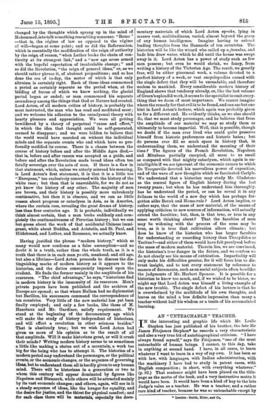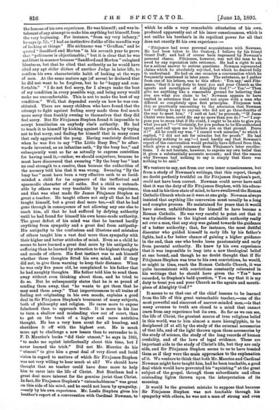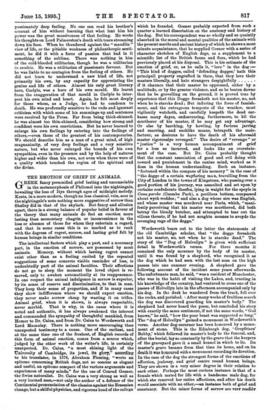AN " ITNTEACHABLE " TEACHER.
IN the interesting and graphic life which Mr. Leslie Stephen has just published of his brother, the late Sir James Fitzjames Stephen* he records a very characteristic and also a very true bit of autobiographical criticism. " I have always found myself," says Sir Fitzjames, "one of the most unteachable of human beings. I cannot, to this day, take in anything at second hand. I have, in all cases, to learn whatever I want to learn in a way of my own. It has been so with law, with languages, with Indian administration, with the machinery I have had to study in patent cases, with English composition ; in short, with everything whatever." (p. 92.) That sentence might have been placed on the title- page as the motto of the book, and a very instructive motto it would have been. It would have been a kind of key to the late Judge's value as a teacher. He was a teacher, and a rather rare kind of teacher, because he was so unteachable except by IN the interesting and graphic life which Mr. Leslie Stephen has just published of his brother, the late Sir James Fitzjames Stephen* he records a very characteristic and also a very true bit of autobiographical criticism. " I have always found myself," says Sir Fitzjames, "one of the most unteachable of human beings. I cannot, to this day, take in anything at second hand. I have, in all cases, to learn whatever I want to learn in a way of my own. It has been so with law, with languages, with Indian administration, with the machinery I have had to study in patent cases, with English composition ; in short, with everything whatever." (p. 92.) That sentence might have been placed on the title- page as the motto of the book, and a very instructive motto it would have been. It would have been a kind of key to the late Judge's value as a teacher. He was a teacher, and a rather rare kind of teacher, because he was so unteachable except by
• London : Smith, Elder, and Co,
the lessons of his own experience. He was himself; and was in- tolerant of any attempt to make him anything but himself, from the very beginning. For instance, "from my very infancy," be says (p. 72), " I had an instinctive dislike of the maudlin way of looking at things." His nickname was " Graffian," and he quoted "Sandford and Merton" in his seventh year to prove that "politeness is objectionable ; " but it is clear that he was not blunt in manner because "Sandford and Merton " eulogised bluntness, but that he cited that authority as he would have cited any apt obiter dictum of another Judge in later life, to confirm his own characteristic habit of looking at the ways of men. At the same mature age (of seven) he declared that he did not want to be forgiven, but to be "happy and com- fortable." " I do not feel sorry, for I always make the best of my condition in every possible way, and being sorry would make me uncomfortable. This is not to make the best of my condition." Well, that depended surely on how he was con- stituted. There are many children who have found that the attempt to fight against feeling sorry made them feel much more sorry than frankly owning to themselves that they did feel sorry. But Sir Fitzjames Stephen found it impossible to accept humiliation on anybody else's authority. He had to teach it to himself by kicking against the pricks, by trying not to feel sorry, and finding for himself that in many cases that only aggravated the pang. Having resolutely declined when he was five to say "The Little Busy Bee," he after- wards invented, as an infantine oath, "By the busy bee," and subsequently went so far as actually to express contrition for having used it,—rather, we should conjecture, because he must have discovered that swearing " By the busy bee " lent no real strength to a resolve, than because the authorities of the nursery told him that it was wrong. Swearing "By the busy bee" must have been a very effective oath to so lucid- minded a child for its exposure of the ineffectual and spasmodic character of all oaths. But a child so unteach- able by others was very teachable by his own experience, and that was what made Sir James Fitzjames Stephen so great a teacher. He taught others not only all that he had taught himself, but a great deal more too,—all that he had gone through in consequence of not allowing any one else to teach him, all that he had suffered by defying authority until he had found for himself his own home-made authority. The great defect of his mind was that he learned hardly anything from sympathy and a great deal from antipathy- His antipathy to the confusions and illusions and mistakes of others taught him a vast deal more than sympathy with their higher and better attitudes of mind. Even as a child he seems to have learned a great deal more by his antipathy to suffering than he learned by attraction to the highest thoughts and moods of others. His first instinct was to ask himself whether these thoughts fitted his own mind, and if they did not, to give them warning to keep their distance. When he was only five years old, he complained to his father that he had naughty thoughts. His father told him to send them away without even thinking about them, and he tried to do so. But he subsequently states that he is so proud of sending them away, that "he wants to get them that he may send them away." That imperviousness to all trains of feeling not originating in his own moods, explains a good deal in Sir Fitzjames Stephen's treatment of many subjects, both of philosophy and religion. He cares more to expose falsehood than to approach truth. It is more in his line to turn a shallow and misleading view out of court, than to get on the track of a higher and more nutritive thought. He has a very keen scent for all humbug, and shoulders it off with the highest zest. He is much more apt to challenge a new lesson than to surrender to it. F. D. Maurice's books "did their utmost," he says in 1865, "to make me squint intellectually about this time, but I never learned the trick." Did not Mr. Maurice do his " utmost" to give him a great deal of very direct and lucid vision in regard to matters of which Sir Fitzjames Stephen was not very willing to hear much at all? We should have thought that no teacher could have done more to help him to enter into the life of Christ. But Bentham had a great deal more interest for the genuine jurist than Christ. In fact, Sir Fitzjames Stephen's " unteachableness" was great on this side of his mind, and he could not learn by sympathy, —only by his own experience. Mr. Leslie Stephen gives his brother's report of a conversation with Cardinal Newman, to
which he adds a very remarkable attestation of his own, produced apparently out of his inner consciousness, which is not unlike his brother's in its repellent power for all that does not exactly fit his own experience :-
"Fitzjames had some personal acquaintance with Newman. He had been taken to the Oratory, I believe by his friend Grant Duff ; and had of course been impressed by Newman's personal charm. Fitzjames, however, was not the man to be awed by any reputation into reticence. He had a right to ask for a serious answer to serious questions. Newman represented claims which he absolutely rejected, but which he desired fully to understand. He had on one occasion a conversation which he frequently mentioned in later years. The substance, as I gather from one of his letters, was to this effect : You say,' said Fitz- james, that it is my duty to treat you and your Church as the agents and mouthpiece of Almighty God ? ' —` Yes.'—' Then give me anything like a reasonable ground for believing that you are what you claim to be.' Newman appears to have replied in substance that he could not argue with a man who differed so completely upon first principles. Fitzjames took this as practically amounting to the admission that Newman had nothing to say to anyone who did not go three-fourths of the way to meet him.' I said at last,' he proceeds, "If Jesus Christ were here, could He say no more than you do ? "—" I sup- pose you to mean that if He could, I ought to be able to give you what you ask ?"—" Certainly, for you profess to be His authorised se,ent, and call upon me to believe you on that ground. Prove it'!" All he could say was, " I cannot work miracles," to which I replied, " I did not ask for miracles but for proofs." He had absolutely nothing to say.'—I need hardly say that Newman's report of the conversation would probably have differed from this, which gives a rough summary from Fitzjames's later recollec- tions. I do not hesitate, however, to express my own belief that it gives a substantially accurate account ; and that the reason why Newman had nothing to say is simply that there was nothing to be said."
We venture to say, not from our own inner consciousness, but from a study of Newman's writings, that this report, though no doubt perfectly truthful on Sir Fitzjames Stephen's part,
could not have been correct. Newman could never have said that it was the duty of Sir Fitzjames Stephen, with his educa- tion and in his then state of mind, to have swallowed the Roman Catholic Church whole as it were at one gulp. Newman always insisted that anything like conversion must usually be a long and complex process. He maintained for years that it would have shown unfaithfulness for himself to have become a
Roman Catholic. He was very careful to point out that it was by obedience to the highest attainable authority really set over a man, that any step was gained towards the guidance of a better authority ; that, for instance, the most dutiful dissenter who guided himself in early life by his father's lights, had a far better chance of gaining a higher guidance in the end, than one who broke loose passionately and early from parental authority. He knew by his own experience that it was impossible to leap into a new theological belief at one bound, and though he no doubt thought that if Sir Fitzjames Stephen was true to his own convictions, he would, or might in time, reach the Roman Catholic Church, it was quite inconsistent with convictions constantly reiterated in his writings that he should have given the " Yes " here recorded, to Stephen's bald question, " You say that it is my
duty to treat you and your Church as the agents and mouth- piece of Almighty God P"
It seems to us that one of the chief lessons to be learned from the life of this great unteachable teacher,—one of the most powerful and sincerest of narrow-minded men,—is that many avenues to truth are closed to a mind that cannot learn from any experience but its own. So far as we can see, the life of Christ, the greatest source of true religious belief in this world, was to him almost a mere hieroglyphic, to be deciphered (if at all) by the study of the external accessories of that life, and of the light thrown upon these accessories by the study of science, the study of the long records of human credulity, and of the laws of legal evidence. These are
important aids to the study of Christ's life, but they are only aids, and Sir Fitzjames Stephen seems to us to have treated them as if they were the 'main approaches to the explanation of it. We venture to think that both Mr. Maurice and Cardinal
Newman might have taught him, had he been teachable, a good deal which would have prevented his "squinting" at the great subject of the gospel, throu6 these subordinate and often misleading lights thrown upon the interpretation of its meaning.
It would be the greatest mistake to suppose that because Sir Fitzjames Stephen was not teachable through his sympathy with others, he was not a man of strong and even
passionately deep feeling. No one can read his brother's account of him without learning that what lent him his power was the great massiveness of that feeling. He wrote his thoughts on Lord Palmerston's death with tears streaming down his face. When he thundered against the " maudlin " view of life, or the pitiable weakness of philanthropic senti- ment, he did it with a force of passion that had in it something of the sublime. There was nothing in him of the cold-blooded utilitarian, though he was a utilitarian in excelsis. He was a utilitarian of passionate fervour. But he was liable to no contagion from the feeling of others. He did not learn to understand a new kind of life, not primarily his own, by any capacity for appreciating the genius and life of others. Almost his only great literary hero, Carlyle, was a hero of his own mould. He learnt from the exaggeration of that mould in Carlyle to inter- pret his own mind and heart. Again, he felt most deeply for those whom, as a Judge, he had to condemn to death. He was profoundly sensitive to the rude and ignorant criticism with which some of his summings-up and sentences were received by the Press. Far from being thick-skinned, he was almost too thin-skinned, considering how strong and confident were his own convictions. But he never learned to enlarge his own feelings by entering into the feelings of others,—even those of the greatest of his contemporaries. We should describe him as a man of a great mind, of high magnanimity, of very deep feelings and a very sensitive nature, but who never enlarged the bounds of his own sympathies, even in the presence and by the help of natures higher and wider than his own, not even when these were of a quality which touched the region of the spiritual and the divine.




































 Previous page
Previous page